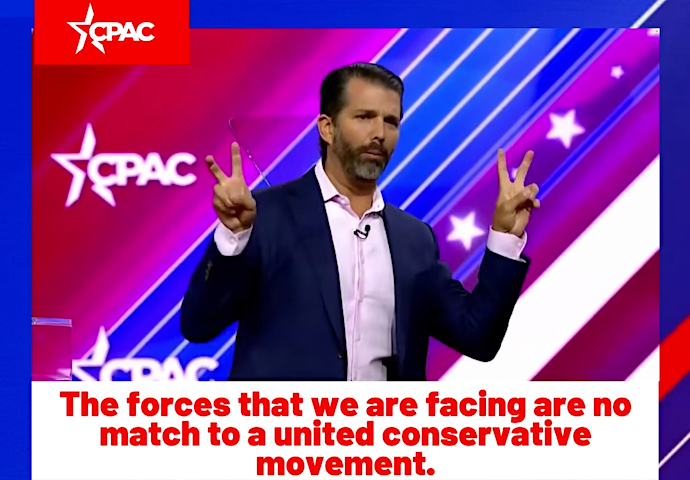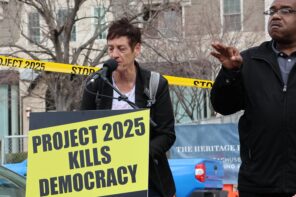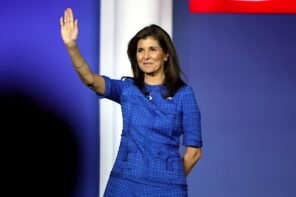Considering that CPAC is the largest conservative conference in the US, the line-up of their 2023 conference was distinctly unimpressive, with some notable names absent from the list of speakers. While Mitch McConnell hasn’t been invited to CPAC in years, the absences of Kevin McCarthy, Ron DeSantis and Mike Pence were more notable—yet logical. Pence likely had no desire to speak in front of a MAGA crowd, that still likely bears ill will against him after January 6th—and might be more inclined to chant “Hang Mike Pence” than cheer for him. It’s unlikely that DeSantis would have been welcome either, since he’s likely to be Trump’s only serious rival for the GOP nomination. McCarthy, I imagine, had better things to do than listen to Lauren Boebert yell about how she and other far-right colleagues had prevailed over him during his humiliating election for the speaker of the House.
Other conservatives stayed away due to allegations that head of CPAC (and the American Conservative Union), Matt Schlapp, tried to grope one of Herschel Walker’s male staffers. The staffer is now suing Schlapp who has denied the allegations. The large ballroom of the main stage was half-filled at the best of times—even during Trump’s speech, the “highlight” of the conference. Perhaps more than ever before, this year’s CPAC was a spectacle of right-wing grifters, garish influencers hoping to make it to Fox News with a viral clip, and the most MAGA of the pro-Trump wing of the Republican Party.
The speakers who turned up tried their best to rile up the audience—with varying levels of success. Jair Bolsonaro, the disgraced former President of Brazil who fled his country for fear of being arrested due to his role in the insurrection, received an enthusiastic reception as he waxed on about “God and fatherland,” lauded Trump, and dished up his own version of the “Big Lie.”
What was notable was the anti-Ukraine sentiment in many of the speeches, which seemed to echo Russian propaganda. Tulsi Gabbard, the former Democrat from Hawaii, claimed that the Biden administration and NATO were “waging a proxy war through Ukraine against Russia,” painting NATO as the aggressor and claiming that Biden wants “World War 3”—a theme that Trump would later pick up in his closing speech. Gabbard further declared that Biden and his allies would be on board with WW3, “because they have the bunkers’,” unlike normal folks (like herself).
Gabbard wasn’t the only one hostile to the Ukrainian cause of defending their country from the Russian invasion. Kari Lake was one of the many speakers who scolded American politicians for being “more interested in helping Ukraine than in helping their own citizens.” Marjorie Taylor Greene got the audience to boo President Zelenskyy, claiming that he “wants our sons and daughters to die in Ukraine.”
Whoever was watching this conference in the Kremlin must feel giddy knowing that Putin may only need to hold out until 2024—under a GOP president, it appears, Ukraine should not expect aid.
The Right’s admiration of Russia hasn’t subsided, even though the images from a besieged Ukraine—the slaughtered civilians, including children—forced them to tone down their accolades for Putin a bit over the last year. Putin’s Russia is their utopia; they imagine it as a White, conservative Christian promised land, with a strong authoritarian leader (no matter how accurate this portrayal actually is). They see it as something to be aspired to, not reviled.
Christian nationalism was a big theme at this year’s CPAC, from Mike Lindell yelling about the “greatest revival of Jesus Christ in history” to Lauren Boebert giving an incoherent version of a Bible study (in which the mountain she was ordering to move was “wokeness,” but also laundry, “am I right, moms?”). And then there was Kari Lake, repeatedly referencing God to loud cheers from the audience.
Lake’s performance stood out from the loud, garish appearances of her colleagues. Lake didn’t have to scream, and that, in a way, made her performance more threatening. Having walked on stage to deafening “Kari! Kari!” chants, she referred to herself as just a “fed-up mom who decided to walk back from her job in the fake-news media” who decided to run for governor of Arizona.
Lake’s “aw shucks”-style, airbrushed to the nines and softly spoken, was more effective than Boebert’s yelling, possibly because she managed to more convincingly portray herself as an ordinary Christian mother, thrust into politics by her desire to defend her family. “They messed with the wrong momma bear, and this momma bear will tear them to shreds!” she declared—“them” being an ominous secretive group trying to destroy America, according to her.
The authoritarian tendencies evident throughout many of the speaking slots were stunning to witness. As he introduced the former Brazilian president, the CPAC vice chairman bemoaned that Jair Bolsonaro lost his election because he “was unfortunately not able to control the Brazilian Supreme Court.” The crowd went wild —insurrectionists supporting each other—and Bolsonaro was true to his nickname, the “Trump of the tropics,” spreading lies and falsehoods about his time in office with Christian nationalist overtones, emphasizing the role of God in government, and claiming “I’m not a priest nor a pastor, only a Christian,” to more loud applause. But the most enthusiastic response came from his nod to transphobia and anti-LGBTQ sentiment: “We don’t want gender ideology! … Girls should be looking up to their mothers, sons to their fathers.”
Indeed, transphobia was one of the themes of this year’s CPAC, with speakers like Michael Knowles openly calling for the genocide of trans people: “there can be no middle way in dealing with transgenderism. … Transgenderism must be eradicated from public life entirely.” Knowles has since protested that he did not call for the eradication of trans people, but “transgenderism,” as if that makes any practical difference.
Trump ended up speaking for more than 100 minutes. It was a wild ride, even for him. Rather than a coherent speech, it seemed at times like an AI had been fed right-wing talking points and gone on a rampage. “I am your warrior, I am your justice. And for those who have been wronged and betrayed, I am your retribution, I am your retribution,” Trump announced to enthusiastic cheers.
He amped up his 2016 vision of “American carnage,” announcing that he would send the National Guard to reinstate “order” in certain Democratic cities, hinting at implementing martial law and advocated for what sounds a lot like concentration camps for homeless people. He also proclaimed that if re-elected president, he would “use all necessary state, local, federal, and military resources to carry out the largest domestic deportation operation in American history.”
Taking a page out of Viktor Orbán’s playbook, he promised his audience of die-hard fans “a baby boom,” including “baby bonuses”—inserting his very own brand of crudeness, announcing “you men out there are so lucky. You are so lucky, men”—presumably with all the sex they will be having to get those sweet baby bonuses. From a European perspective, one of the more chilling moments of the speech was when he fantasized about Russia destroying the NATO headquarters (“one clear shot from a tank!”), and praised his good relationship with Putin.
A lot of the media reports of CPAC have claimed that there is a rift in the Republican Party, that the party is being torn in two. Some mention the “Principles First” summit as a competing event, which took place during the same time as CPAC. However, if you take a closer look at the roster of speakers, you won’t find a single Republican with influence in the current GOP. Conservatives like Adam Kinzinger and Bill Kristol, whose Bulwark was one of the partners of the event, have long been denounced by the current GOP as traitors to movement conservatism. Kristol refers to himself as a liberal now—accordingly, “The Principles First” summit was branded as a gathering of “liberals,” following the trend of traditional conservatives or libertarians—what amounts to today’s centrists—identifying as “classical liberals.” No one who appeared there has even the slightest chances of a political career or even comeback in today’s GOP.
And while Pence, Tim Scott and DeSantis—who’ve all spoken at CPAC in previous years—were indeed guests at an event hosted by the anti-tax advocacy group Club for Growth, an influential player in Republican politics, claims of a “split” on the Right neglects the lesson we should have learned by now regarding the Right: while parts of the establishment would rather not see Trump as the next candidate, they’re largely united when it comes to their vision. Their aim is to turn the U.S. into a White, conservative Christian, authoritarian nation with little to no corporate regulation; and they aim to eradicate trans people from public life, to support unchecked police power, to ban abortion and to punish anyone who fails to adhere to their rules—rules which are only being supported by a minority of Americans.
The Right has shown previously that they are utterly pragmatic when it comes to choosing their new leader. If the base can’t be convinced by DeSantis, they will fall back into line behind Trump. Don’t let the spectacle of CPAC’s performative divisiveness fool you—the candidates present only a slightly different brand of authoritarianism or even fascism, but the core of their ideology is the same. Both are anti-democratic, pro-natalist, ethno-Nationalist, right-wing Christian, and authoritarian. And when it comes to those things, the Republican Party is not divided at all: they present a pretty united front. Like a closed fist.





